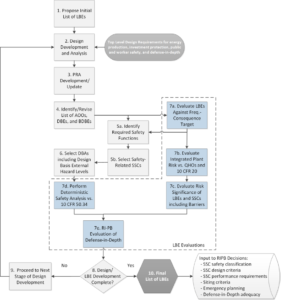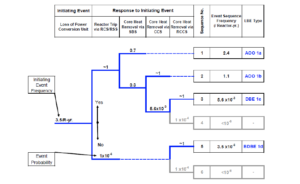SECY-19-0117 (December 2, 2019) and Regulatory Guide 1.233 Revision 0 (June 2020) provide the regulatory guidance for a technology-inclusive, risk-informed, and performance-based methodology to inform the licensing basis and content for applications of licenses, certifications, and approvals for non-light water reactors. NEI 18-04 Revision 0 (August 2019) provides the risk-informed performance-based technology Inclusive guidance for non-light water reactor licensing basis development
The license application for advanced reactors will include a safety evaluation of a set of licensing basis events (LBEs). LBEs are defined as the events derived from advanced reactor technology and plant design that are considered by the licensing process and are used in development of the license application. Defining LBEs creates a comprehensive set of event sequences that form the basis for plant analysis and represent the plant’s characteristic performance in all analyzed frequency and consequence ranges. LBEs include conditions of normal operation, including anticipated operational occurrences (AOOs), infrequent design basis events (DBEs), and beyond design basis events (BDBEs) that inform the deterministically selected design basis accidents (DBAs).
The PRA may be introduced at any stage of design, however the benefits of incorporation of risk insights into the design favor early introduction. A PRA model is developed and then updated as appropriate for each phase of the design. Prior to the first introduction of the PRA, it is necessary to develop a technically sound understanding of the potential failure modes of the reactor concept, how the plant would respond to such failure modes, and how protective strategies can be incorporated into formulating the safety design approach. The incorporation of safety analysis methods appropriates to early stages of design, such as FMEA and process hazard analysis (PHA), provide early-stage evaluations that are systematic, reproducible, and as complete as the current stage of design permits. The PRA models the response of each SSC in the plant that performs a function to prevent or mitigate a release of radioactive material from any radionuclide source within the scope of the PRA. These SSC functions are defined in the LMP methodology as PRA Safety Functions (PSFs).
A systematic performance-based and risk-informed methodology for selecting and classifying LBEs for advanced reactor designs, is consistent with the current Nuclear Regulatory Commission (NRC) policies and guidance on the application of deterministic design criteria (including defense-in-depth) and the use of probabilistic risk assessment (PRA) techniques. Figure 1 provides an overview of the LBE selection and evaluation process, based on NEI 18-04, Revision 1. As indicated in the conceptual example provided on Figure 2, the use of deterministic safety principles and PRA insights are critical inputs into the selection of LBEs. These events include specific scenarios to which mechanistic source terms are applied and assessed against offsite dose criteria. The event sequences modeled and evaluated in the PRA are grouped into event sequence families, each having a similar Initiating Event, challenge to the PSFs, plant response, end state, and mechanistic source term if there is a radiological release. Each of these families is assigned to an LBE category based on mean event sequence frequency of occurrence per plant-year summed over all the event sequences in the LBE family. The event sequence families may confirm or revise the identified initial events.

Figure 1 – Licensing Basis Event (LBE) Selection and Evaluation Process

Figure 2 – Example PRA Event Tree Model to Support Selection of LBEs
The ENERCON PRA staff has participated in the development of advanced reactors, including small modular reactors, over the last decade. Members of the staff performed risk evaluations (including Severe Accident Mitigation Design Alternatives and Reliability Assurance Program / Regulatory Treatment of Non-Safety Systems) to support the licensing of advanced reactors, including design certifications and combined operating license applications. ENERCON staff have developed risk assessments for advanced light water reactors, as well as supporting risk evaluations for sodium fast reactors. The staff have also performed risk evaluations of operating advanced light water reactors (ALWRs). The staff is currently supporting number of small modular reactor initiatives.
